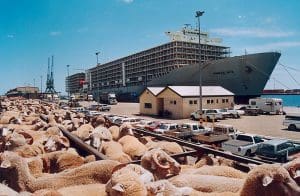THE Department of Agriculture has extended the prohibited period for live sheep exports to, or through, the Middle East by three weeks to 22 September 2019, in a move welcomed by animal groups but criticised as ‘flawed’ by exporters.
 The department said it considered the best available science and evidence, and feedback from public consultation, before making the decision.
The department said it considered the best available science and evidence, and feedback from public consultation, before making the decision.
It said the interests of the industry, animal welfare and government policy were also taken into account.
“Evidence indicates the risk of heat stress for voyages departing Australia in the first three weeks of September is comparable to, or higher than in June,’ the Department said in a statement released on Wednesday.
“The department determined conditions in June (along with July and August) are too hot for sheep exports. The industry came to a similar conclusion.
“Furthermore, sheep departing Australia in early- to mid-September are acclimatised to cooler Australian temperatures and therefore less heat tolerant than sheep departing in Australian summer or autumn months.
“For October, the risk of an animal welfare incident related to heat stress is more aligned with conditions in May.”
Once trade resumes, shipments to, or through, the Middle East must comply with the same conditions that applied in May 2019.
These requirements include:
- verification of the ship’s pen air turnover
- a heat stress management plan
- stocking sheep in accordance with an allometric formula or the heat stress assessment model – depending on which provides more space per animal
- collecting automated environmental data (wet bulb temperatures) and reporting to the department
The department said the decision only relates to 2019.
Future regulation of live sheep exports to, or through, the Middle East will be decided following a Regulation Impact Statement process.
RSCPA calls for longer extension
The RSPCA said the move was an important step forward in protecting the welfare of Australian animals, but said it still holds high concerns for the continuation of October trading.
RSPCA senior policy officer, Dr Jed Goodfellow, said exports to the Middle East during September and October were arguably more dangerous than those occurring at the start of the northern summer period, as Australian sheep were more acclimatised to cooler temperatures, having just experienced four months of cold and cool conditions.
“The science has shown that live sheep exported into the northern summer, at any time during the hottest period from May to October, are at very high risk of suffering from heat stress, which can be fatal. This week’s decision is another step towards ensuring that Australian sheep are protected from searing conditions on board these ships.”
Decision ‘reverse engineered’ to secure pre-determined outcome: Exporter
However live exporter Wellard described the decision to extend the three month moratorium by another three weeks as flawed.
Wellard said it ignored recent performance data and relied on selective data points to “reverse engineer” a pre-determined outcome, designed to appease a vocal minority “hellbent on regulating the industry out of existence to the detriment of sheep farmers, our long-term trading partners and global animal welfare outcomes which are worse off if Australian exports are stopped”.
Wellard executive chairman John Klepec said the decision appeared to utilise 28 Celsius Wet Bulb Temperature as the heat stress threshold, which he said was a flawed baseline based on eight sheep in a controlled PhD thesis experiment, not millions of sheep shipped over decades.
“Recent changes made to stocking densities coupled with use of the right ships have proven that animal welfare can be maintained in the Middle Eastern summer shoulder months, yet this exceptional performance has been ignored and risks killing-off the trade completely,” Mr Klepec said.
“The live export industry has undergone significant regulatory change. It’s time to assess the impact of those changes before imposing even more trade restrictions based on minority beliefs not the reality.”
WAFarmers also voiced its disappointment about the decision.
WAFarmers Livestock President, David Slade said the changes further compromise the value of the live sheep trade to Western Australian producers, and places at risk every aspect of the sheep supply chain with little notice.
“The exporters and wider industry have adopted all the necessary and precautionary measures outlined by the government, and it appears the department has ignored industry data, particularly around the minimal animal welfare risks recorded in the 2019 May shipments,” Mr Slade said.
“The Federal Minister should have directed the department to support the more workable options put forth by industry, before signing off on the extension.
“It’s unfortunate that the live sheep trade will be further jeopardised by these moratorium changes announced late yesterday. It seems the government is using regulation to render the industry unviable.
“The industry has worked hard to adhere to, and implement the new recommendations supporting the ASEL model and McCarthy Review. Industry now requires time to prove the measures set out by the Regulator are achievable and viable, this includes accurate shipping data for the month of September 2019.
“Accurate daily reporting under real-time temperature conditions, is what is needed to prove the safe passage of livestock aboard live export vessels. Industry deserves and requires the time to meet such reporting requirements.”

Animals are all precious; sheep for the Middle East live is a religious choice for those wanting to eat untainted meat. I am totally against the Middle East wanting our sheep live. On board the ship they are squashed against each other, heat-stressed and frightened. Let the Middle East eat frozen lamb like Australians do.